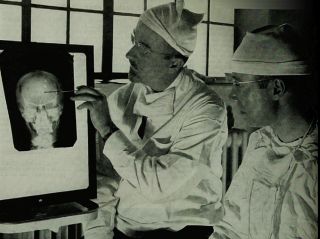Intuition
Getting Rid of Your Feelings: Does It Help?
The importance of feelings in psychological life.
Posted March 4, 2015 Reviewed by Jessica Schrader

Feelings are the boon and bane of psychological life. They are the heart and soul that make life worth living as well as the troublemakers that wreak havoc and hold us back. Alongside learning to think, learning to deal well with our feelings is one of the most important psychological skills that we can develop. And it is challenging to do so. As the writer Louisa May Alcott put it so sweetly: “A little kingdom I possess, where thoughts and feelings dwell; and very hard the task I find of governing it well.” As I like to say, a bit more crudely, “Damn feelings. Can’t live with ‘em; can’t live without ‘em!”
You know what I’m talking about. Intense feelings are just so hard to manage. Often, they feel too hot to handle. They put a kind of pressure on us to act and react in harmful, reckless, or unwise ways. Fired up by intense love, we want to run from it or jump headlong into it. Churned up by intense frustration, we want to punch the wall or throw in the towel. Lit up by anger, we want to hurt someone, anyone, even ourselves.
Then there’s the other maddening dynamic we must face—our feelings confuse us. Love and hate collide. Fear and longing co-exist. Desire, hope, and dread are all mixed up. We don’t know what we feel. We don’t know how to feel. We are paralyzed by confusion. We don’t know which way to turn.
Because feelings can be so overwhelming, we often have the misconception that the best way to deal with them is to get rid of them. We think of our feelings as a problem, a threat, a nuisance, and a bother. We imagine that life would be so much easier if we could just shut them down entirely and for good.
Whether we use projection, repression, suppression, or just plain denial, attempting to turn off our feelings is a strategy that eventually backfires. The one who quells anger is the one who later explodes. The one who denies sexual feelings winds up acting out in the shadows. The one who shuns love becomes tormented by what is missing. Simply put, we become preoccupied with the very feelings we are trying to avoid.
Getting rid of feelings not only backfires but it also drains us of the psychological energy that makes life worth living. Feelings are the gas in the engine of our personalities. They are the source of motivation. They are the energy, the vitality, the juice of life. Without them, our lives wouldn’t have any personality or dimension or color. There wouldn’t be any joy or creativity or fun. There wouldn’t be you. There wouldn’t be me. Without our feelings, nothing would really matter.
Think about the words we use to describe people who are cut off from their feelings: stoic, aloof, vacant, distant, or robotic. When we interact with such folks, we immediately have a sense that there is no “there” there. That’s because getting rid of feelings is an all-or-nothing proposition. You can’t pick and choose. If you try to get rid of your feelings, you must get rid of all of them. And if you get rid of all of them, you can’t help but go flat.

These observations have been confirmed by research scientists, as well. Antonio Damasio*, an internationally famous neuroscientist, has made his career by studying the role that emotions play in our lives. His extensive research with people who have had damage to the frontal lobe of the brain gives us a hint about the critical role that feelings play in healthy psychological functioning.
Damasio discovered that there is a strong mind-body or mind-brain connection and that many problems occur when this connection is disrupted. One of these problems involves our ability to access and make use of our feelings. Patients with particular types of frontal lobe brain damage are so cut off from their feelings that, even in extremely emotionally arousing situations, they are emotionally blank. What is interesting, however, is that they still have a logical, rational understanding of their psychological and social worlds. They know that they should feel something but they just don’t. They know that something is off, but they don’t know what it is. While they perform well on intelligence and decision-making tests in the laboratory, they are lost in the real world. They have no clue about what is going on.
Damasio concluded that such patients struggle in the real world because they lack the important information that we normally get from our “gut feelings.” Gut feelings are kind of like intuition; they give us an instantaneous sense about what we should focus on. They narrow the field, so to speak, helping us sort out the complex information with which we are bombarded in this dodge-ball-like world of ours. What’s going on here? What are the rules of the game? What should I do? Who should I trust? Which way should I go? Gut feelings help us get our bearings.

Taken together, these observations reveal an important truth. Feelings help us think. They are critical in pointing us in the right direction, showing us what to focus on, and helping us sort out the good from the bad and the safety from the danger. Without them, we would be hopelessly lost in a sea of indecision. Without them, we couldn’t connect in a meaningful way with ourselves or one another. This is what I mean by the idea that we can’t live without our feelings. Even if we could be rid of them—which, short of a brain injury, tumor, or frontal lobotomy, we really can’t—we wouldn’t want to. Feelings provide information essential to thinking and relating. We simply can’t live—I mean really live—without them.
The real challenge, then, is to learn to deal with them. That is the subject of next week's post.
Copyright 2015 Jennifer Kunst, Ph.D.
This post is an excerpt from my book, Wisdom from the Couch: Knowing and Growing Yourself from the Inside Out. Follow me on Twitter @CouchWisdom.
References
Antonio Damasio, The Feeling of What Happens: Body and Emotion in the Making of Consciousness, (Florida, Mariner Books, 2000).




